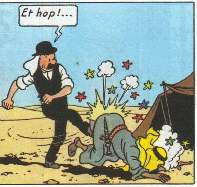 ...10th president-for-life of Algeria. He was elected in 1999 and served on his third or four terms. When he announced for the fifth, or maybe it was the sixth, visibly doddering, a grateful nation rose up in its wrath and threw him out...
...10th president-for-life of Algeria. He was elected in 1999 and served on his third or four terms. When he announced for the fifth, or maybe it was the sixth, visibly doddering, a grateful nation rose up in its wrath and threw him out..., who died this month, local media reported.
Defense lawyer Miloud Brahimi requested the postponement, citing Said Bouteflika's "psychological condition" after the September 17 death of his brother.
Algerian media said the 63-year-old who served as presidential advisor appeared pale and weak at the court hearing.
The trial of Bouteflika and several co-defendants in the capital's Dar el-Beida suburb was delayed until October 10, but a defense request for their release on bail was turned down.
Said Bouteflika was detained in May 2019, a month after his brother quit office following mass protests against his bid for a fifth presidential term.
Said was sentenced to 15 years in prison for "plotting" against the army and the state, but a retrial in January cleared him of those charges.
He remains in jug on corruption charges, along with several other political and business leaders from the Bouteflika era.
The once-mighty presidential aide was long seen as the real power running the North African country after his brother suffered a debilitating stroke in 2013.
[PUBLISH.TWITTER]
A court in the Algerian capital has postponed the corruption trial of the younger brother of ousted president Abdelaziz Bouteflika, who died this month, according to local media reports.https://t.co/IkHtI6vCef
— Al Arabiya English (@AlArabiya_Eng) September 26, 2021

 President Francois Hollande refused to apologize for France's colonial past in Algeria, saying instead that Paris wanted to move forward on an equal footing and boost trade with the north African nation. Speaking on his first state visit since his election in May, Hollande said the two had agreed on a friendship declaration and a five-year strategic pact over economic, cultural, agricultural and defense ties.
President Francois Hollande refused to apologize for France's colonial past in Algeria, saying instead that Paris wanted to move forward on an equal footing and boost trade with the north African nation. Speaking on his first state visit since his election in May, Hollande said the two had agreed on a friendship declaration and a five-year strategic pact over economic, cultural, agricultural and defense ties. [Ennahar] Chanting "free and democratic Algeria", "the people want the fall of the regime," some 200 people on Saturday braved heavy police deployment in central Algiers to protest, according to a journalists from the AFP.
[Ennahar] Chanting "free and democratic Algeria", "the people want the fall of the regime," some 200 people on Saturday braved heavy police deployment in central Algiers to protest, according to a journalists from the AFP.